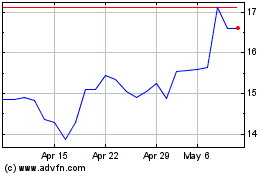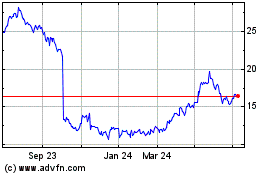Jeff Immelt says General Electric Co. is a haven in a period of
economic doubt, political uncertainty and shareholder activism—and
one too few big investors have come to appreciate.
The GE chief executive's annual letter to shareholders this year
takes the form of a wide-ranging commentary on topics such as
political populism, shareholder activism and the ways in which GE
could take advantage of declining commodity prices to snap up
competitors.
GE is still "underowned" by institutional investors, Mr. Immelt
argues in the letter, despite efforts to learn from the demands of
activists driving change at big companies across the market
spectrum. The CEO is embracing "humbling" input from a cadre of
young GE workers as he tries to simplify the conglomerate and
recognize "the evil nature of corporate bureaucracy."
And Mr. Immelt is wary of the tense relations between business
and government around the world, charging that "most government
policy is anti-growth."
"In the U.S., we want exports but seem to hate trade and
exporters; globally, governments love small businesses but then
regulate them to death," he writes in the 19-page letter. "And so,
we perpetuate a cycle: slow growth, poor job creation, populism,
low productivity, higher regulation, poor policy and more slow
growth."
The state-of-the-company message comes amid what Mr. Immelt
portrays as a generational shift at GE—and after one of Mr.
Immelt's best years. Profit fell across most of GE's industrial
business in the fourth quarter and more pain is coming in oil and
gas. But GE shares were up more than 20% in 2015, in what GE says
is a reflection of confidence in Mr. Immelt's corporate pivot away
from finance.
GE last year launched and executed most of a plan to sell off
the bulk of its huge GE Capital lending arm, which once generated
half the company's profit but worried investors after nearly
imploding during the financial crisis. The company sealed a deal
for its largest industrial acquisition to date, the $10 billion
purchase of France-based Alstom SA's power assets.
And the company successfully managed the appearance of an
activist at its gates. Trian Fund Management LP, the activist firm
run by Nelson Peltz, disclosed a $2.5 billion stake in GE in
October. Trian called on the company to use its freedom from GE
Capital to increase its leverage and buy back more stock. In the
same breath, however, Mr. Peltz praised GE's management and Mr.
Immelt himself.
In his letter, Mr. Immelt suggests that GE should be diagnosing
the problems called out by activists, and criticizes some unnamed
investors for focusing on short-term results, rather than the
long-term industrial investments around which he increasingly seeks
to focus GE.
"To be honest, I don't think activists are necessarily bad for
companies," Mr. Immelt writes, adding that GE has "done a better
job of being our own activist."
"When a business team fails in GE, this is what you find:
complicated accountability, too much cost in the wrong places,
excessive priorities and low market awareness," he writes. "These
are factors activists point to when they criticize companies. Shame
on us if we need help from the outside to find this out."
While critical of activists seeking short-term payoffs, Mr.
Immelt also trains his fire on large institutional investors, who
he says have "allowed governance to become too legalistic, about
politics instead of protecting the average investor."
"We have delivered for you in the last five years," he writes.
"But we are still underowned by big investors."
Mr. Immelt's annual letter can hold clues to management's plans.
This year, Mr. Immelt suggests GE will continue to aggressively cut
costs from its operations, in keeping with guidance he offered
investors in December. He also signaled an appetite for
acquisitions, suggesting GE could find good assets for sale at low
valuations thanks to volatility in the global economy, especially
linked to the low price of oil.
That decline is hitting GE's oil and gas business too. Between
2014 and 2016, GE expects earnings in the unit, which makes
equipment for drilling, exploration and processing, to fall 20% to
25%, Mr. Immelt writes. But the unit will be able to retrench and
grow stronger through the downturn, he says, thanks to the
diversification provided by GE's structure, and because GE is
better positioned to weather a storm.
"Unlike the financial crisis, in this cycle GE has substantial
firepower to make strategic investments that create value," he
writes.
Mr. Immelt says GE can raise earnings 15% a year over the next
three years, to more than $2 a share. From 2015 through 2018, the
company will send about $100 billion back to shareholders through a
combination of share buybacks and dividends, he says.
The CEO also gave a defense against what has been a pervasive
criticism of GE, including from Trian: that the company hasn't had
a good track record on mergers and acquisitions under his watch. In
highlighting GE Healthcare's push into life sciences, Mr. Immelt
includes an oblique reference to the company's $9.5 billion
purchase of Amersham PLC, a deal where many analysts still believe
GE overpaid.
"Building this position was facilitated by an 'expensive'
acquisition that today looks like a bargain," the letter
states.
(END) Dow Jones Newswires
February 29, 2016 09:45 ET (14:45 GMT)
Copyright (c) 2016 Dow Jones & Company, Inc.
Alstom (EU:ALO)
Historical Stock Chart
From Mar 2024 to Apr 2024

Alstom (EU:ALO)
Historical Stock Chart
From Apr 2023 to Apr 2024
